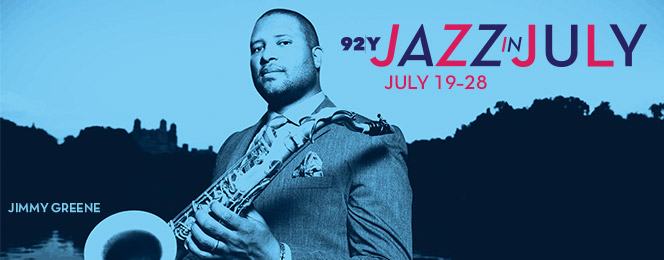by Marilyn Lester
America’s own music, jazz, receives a swinging tribute every July at the 92nd St. Y, thanks to the keen artistic direction of pianist Bill Charlap. Charlap is an educator and brilliant musician as well as an affable host. In the second week of the six-day festival, the spotlight was on a style of jazz, a giant of jazz composition and masters of the American Songbook, not usually thought of as jazz composers.
Kings of Stride: Eubie, Fats and the Lion
Bill Charlap, piano / Rossano Sportiello, piano / Ted Rosenthal, piano / Anat Cohen, clarinet / David Wong, bass / Aaron Kimmel, drums
At the birth of jazz, stride piano became the rage in the 1920s and 30s as an outgrowth of ragtime. Stride is highly rhythmic, with both left and right hands executing complicated chords – so the test for a competent stride pianist was the flawless rapidity of play. Charlap’s solo on Eubie Blake’s classic “Charleston Rag” certified his mastery of the form. Sportiello, playing Fats Waller’s “Handful of Keys” and “Viper’s Drag” demonstrated his stride chops with almost superhuman speed as his hands flew along the keys. Willie the Lion Smith was represented with “Morning Air” played by Charlap at a slow, syncopated pace. Syncopation was also featured in a Scott Joplin ragtime classic, “Maple Leaf Rag” played by Ted Rosenthal. The father of stride piano, James P. Johnson, took the penultimate spot on the bill with a rousing “Charleston” played by Charlap and Sportiello with playful verve.
Clarinetist Anat Cohen was the featured artist on Waller’s “Honeysuckle Rose,” “Crazy ‘Bout My Baby” and “Jitterbug Waltz” as well as Blake’s “Memories of You” and the Lion’s “Echo of Spring.” Cohen is an exceptionally gifted player. She’s able to effortlessly produce earthy, mellow sounds, very reminiscent of the soulfulness and style of the great alto sax player Johnny Hodges. Cohen is young, which means many years ahead to experience her amazing musicianship and observe her growth.
Take the A Train: Billy Strayhorn at 100
Bill Charlap, piano / Renee Rosnes, piano / Carol Sloane, vocals / Jeremy Pelt, trumpet / Steve Wilson, alto sax / Jimmy Greene, tenor sax / Peter Washington, bass / Kenny Washington, drums
Billy Strayhorn, the genius pianist-composer who made a name for himself pairing with Duke Ellington, as well as composing masterpieces in his own right, turned 100 on November 29, 2015. When he died of esophageal cancer in 1967 he hadn’t yet turned 62, but was composing from his hospital bed till the very end. “Raincheck,” with Charlap at the piano and “U.M.M.G.,” with Rosnes at the keys, were two of Strayhorn’s very last works. Strayhorn had a great ear for Ellington’s style and was able to work with the Maestro on an array of pieces that have become jazz classics, such as “Isfahan” and “Tonk,” played by Charlap and Rosnes on dual pianos. The pair also played “Lotus Blossom” which typified the ethereal, meditative style of much of Strayhorn’s solo composing. Wisely, “Lush Life,” a difficult song to master, which Strayhorn composed at age 17, was performed as an instrumental, with Charlap presiding.
Seasoned jazz singer, Carol Sloane, was on hand for several fine vocal interpretations of the canon. Sloane’s command of jazz is legendary; any singer who can master vocalese, as she can, has something going for her. In “Satin Doll,” “Day Dream” and “Something to Live For” Sloane took the pace slowly. She delivered “Just A-Sittin’ and A-Rockin’” with more energy, but it was apparent that while the brilliant phrasing and warm, mellow voice is still entrancing and pure, the power behind it has diminished. The rousing conclusion to the concert was the iconic Ellington Orchestra theme song, penned by Strayhorn, “Take the A Train,” with all musicians participating, and with Sloane singing the 1943 version of the lyrics by Joya Sherrill.
American Rhapsody: Gershwin, Arlen and the Blues
Bill Charlap, piano / Dick Hyman*, piano / Randy Sandke, trumpet / Ken Peplowski, clarinet & tenor sax / Jon Gordon, alto sax / Michael Dease, trombone / Peter Washington, bass / Willie Jones III, drums
The blues is at the center of all jazz, and it’s certainly at the center of George Gershwin’s work, declared Bill Charlap, who proceeded to prove his point. Charlap played a spirited “Nice Work if You Can Get It,” with six instrumental virtuosos. Each, a master of his instrument, was given a featured turn in the program, the highlight of which was trombonist Dease playing Arlen’s “Come Rain or Come Shine” with piano legend Dick Hyman. Hyman, who originated the Jazz in July series, demonstrated his awesome virtuosity, playing dual pianos with Charlap on Gershwin’s “Prelude #2.” The full complement of musicians performed lively versions of Gershwin’s “Somebody Loves Me” and “A Foggy Day” (with Charlap at the piano), Arlen’s “A Woman’s Prerogative” (with Hyman at the keys), and Gershwin’s “S’wonderful” with both piano masters at work.
The finale could be none other than Gershwin’s “Rhapsody in Blue,” arranged by Hyman. The Rhapsody, orchestrated and arranged for these stellar instrumentalists, with pianos in the foreground, was an imaginative and foot-tapping version, capping off not only a superlative concert, but a successful, triumphant two weeks of traditional jazz at its very best. The varied programming, with Charlap at the center of it, not only provided top-notch entertainment, but continues to be indispensable in keeping the music of America alive and thriving.
Jazz in July, July 21, 22 and 23 and July 26, 27 and 28 at 8 pm
92nd St. Y, xxx Lexington Ave., 212-415-5500, www.92y.org


















